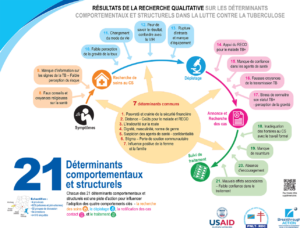Traduction française ci-dessous
The Democratic Republic of Congo (DRC) is among the 30 countries with the highest rates of tuberculosis (TB). Achieving significant progress toward TB elimination requires addressing the social and behavioral factors contributing to the disease. Social and behavior change strategies that target both behavioral and structural determinants have proven to be effective.
To support the goal of eliminating TB by 2030, Breakthrough ACTION collaborated with the National Tuberculosis Program in the DRC to conduct in-depth qualitative research. This research was systematically analyzed to generate actionable insights, which were then used to develop theories of change for key behaviors. These theories identified the factors that either promote or hinder progress toward TB elimination.
The findings guided the creation of DRC’s National Tuberculosis Social and Behavior Change Communication plan. This plan focuses on intentional, evidence-based interventions designed to influence behaviors and address underlying factors driving TB health outcomes. By targeting these priority behaviors and determinants, the efforts to eliminate TB in the DRC are more strategic and effective.
Discover more about this formative research and the 21 behavioral and structural determinants shaping TB outcomes in the DRC.
Déterminants sociaux et comportementaux liés à la tuberculose en République démocratique du Congo
La République démocratique du Congo (RDC) figure parmi les 30 pays où les taux de tuberculose sont les plus élevés. Pour progresser réellement vers l’élimination, le changement social et comportemental (CSC) joue un rôle essentiel et les stratégies de lutte contre la tuberculose qui s’attaquent aux déterminants comportementaux et structurels peuvent être efficaces. Pour soutenir l’objectif du Programme national de lutte contre la tuberculose (PNT) de la RDC d’éliminer la tuberculose d’ici 2030, Breakthrough ACTION-RDC s’est associé au PNT pour mener une recherche qualitative qui a ensuite été traduite en action grâce à un processus d’analyse systématique. Les idées émergentes ont été utilisées pour créer des théories de changement sur les comportements prioritaires et les facteurs qui les facilitent ou les entravent. Ces théories ont ensuite été utilisées pour développer systématiquement le plan national de lutte contre la tuberculose de la RDC et les interventions qui se concentrent intentionnellement sur les comportements et les facteurs qui conduiront à un changement positif des comportements de santé face à la tuberculose, rendant ainsi plus efficaces les efforts visant à éliminer la tuberculose.
En savoir plus sur cette recherche formative et sur les 21 déterminants comportementaux et structurels ayant un impact sur la tuberculose en RDC.


